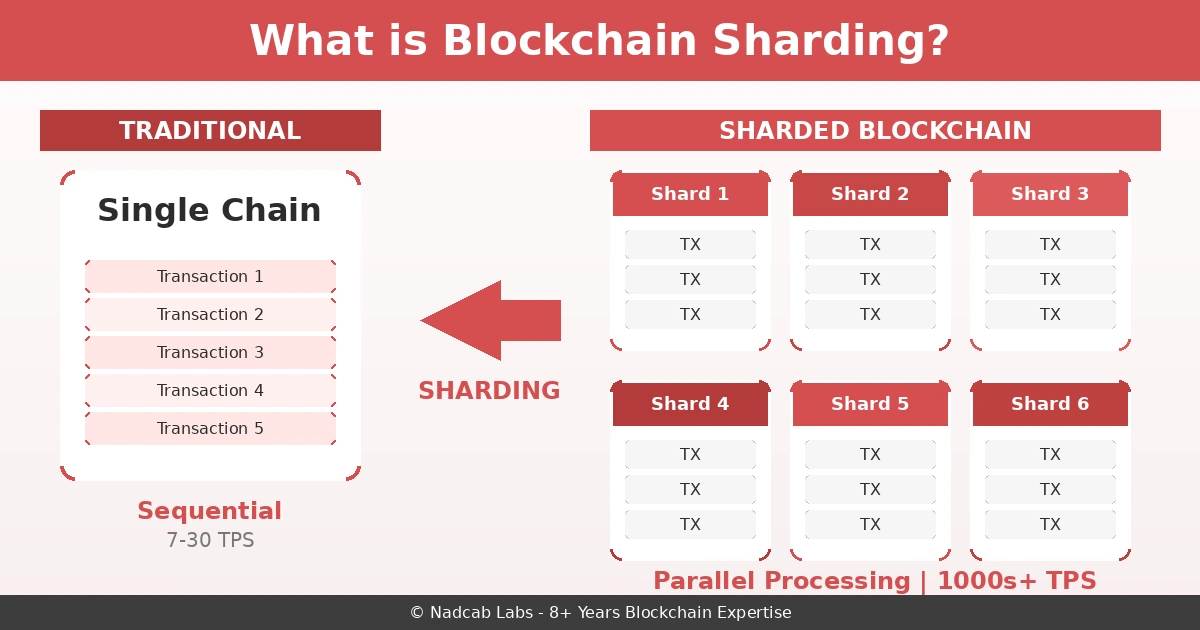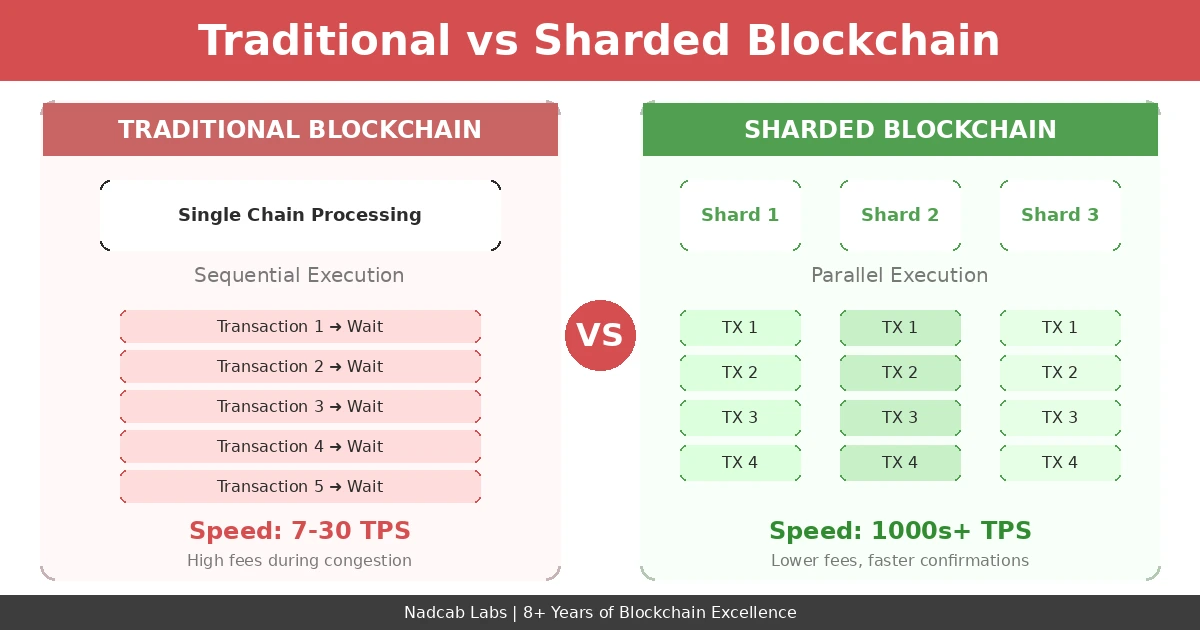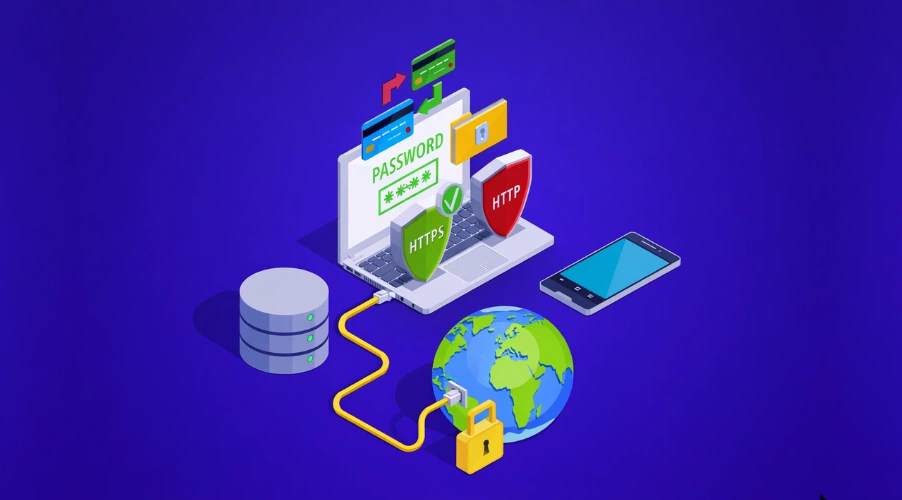Key Takeaways
- Sharding splits a blockchain into smaller segments called shards, allowing parallel transaction processing and faster network speeds.
- This technique directly addresses the scalability problem that plagues traditional blockchains like Bitcoin and early Ethereum versions.
- Major projects including Ethereum 2.0, Zilliqa, and Harmony have adopted sharding to handle millions of transactions efficiently.
- Sharding reduces transaction costs by minimizing network congestion and distributing computational load across multiple nodes.
- Security remains intact through cross-shard communication protocols and distributed validator systems.
- Businesses partnering with experienced blockchain teams like Nadcab Labs can implement custom sharding solutions tailored to their specific needs.
Blockchain technology promised to change how we handle digital transactions. But there is a catch. As more people started using blockchain networks, these systems began to slow down. Transaction fees went up. Waiting times grew longer. The technology that was supposed to be fast and efficient started showing cracks.
This is where sharding comes into the picture. If you have been following how blockchain technology works, you know that every node in a traditional blockchain must process every single transaction. That creates a bottleneck. Sharding breaks this pattern by dividing the network into smaller, manageable pieces.
In this article, we will walk through what sharding actually means, how it functions under the hood, and why it has become one of the most talked about solutions for blockchain scalability. We will also look at real world examples and the practical benefits businesses can expect when implementing this approach.
What is Blockchain Sharding?

Sharding is a database partitioning technique that has been around for decades. The concept originally came from distributed database systems where large datasets needed to be split across multiple servers. According to Wikipedia, a shard is a horizontal partition of data in a database, where each partition is referred to as a shard and held on a separate database server instance.
When applied to blockchain, sharding takes this same principle and uses it to divide the network into smaller partitions. Each partition, or shard, contains its own independent piece of the blockchain state and transaction history. Think of it like breaking a large office building into separate departments. Each department handles its own work without needing to know what every other department is doing at every moment.
The key difference from traditional databases is that blockchain sharding must maintain decentralization and security. This adds layers of complexity. Each shard needs its own set of validators. Cross-shard communication protocols must ensure that transactions involving multiple shards still work correctly. The system must prevent attackers from targeting a single shard to compromise the network.
Understanding the history of blockchain development helps explain why sharding became necessary. Early blockchains were designed for relatively small user bases. Bitcoin handles roughly 7 transactions per second. Ethereum in its original form managed about 15. Compare that to Visa, which processes around 1,700 transactions per second on average. The gap is enormous.
How Does Blockchain Sharding Actually Work?
The mechanics of sharding involve several interconnected processes. Let us break them down step by step.
Network Division
The blockchain network gets divided into multiple shards. Each shard is essentially a mini-blockchain with its own state, transaction history, and set of nodes. The number of shards can vary depending on the network design. Some implementations use a fixed number while others adjust dynamically based on network demand.
Validator Assignment
Validators or nodes get assigned to specific shards. This assignment is typically randomized to prevent attackers from targeting a particular shard. The random selection process happens at regular intervals, so validators rotate between shards over time. This rotation adds another layer of security.
Transaction Processing
When a transaction enters the network, the system determines which shard should handle it based on the addresses involved. If a transaction only involves accounts within a single shard, that shard processes it independently. This is where the speed gains come from. Multiple shards can process their transactions at the same time.
Cross-Shard Communication
Things get more complicated when a transaction involves accounts on different shards. The network uses special protocols to coordinate these cross-shard transactions. One common approach involves a receipt-based system where one shard creates a receipt that the other shard must verify and process. This adds some overhead but maintains consistency.
Beacon Chain Coordination
Many sharded blockchains use a central coordination mechanism called a beacon chain. This chain does not process user transactions. Instead, it keeps track of all the shards, stores references to their states, and helps coordinate validator assignments. Ethereum 2.0 uses this approach.
The Sharding Process Lifecycle
Why Sharding Matters for Blockchain Scalability
The blockchain scalability problem is often described as a trilemma. Networks struggle to achieve decentralization, security, and scalability all at once. Improve one, and you typically sacrifice another. Sharding offers a path to better scalability without completely abandoning the other two pillars.
Consider what happens in a traditional blockchain. Every node must validate and store every transaction. If the network processes 100 transactions, each of the 10,000 nodes does 100 units of work. That is 1 million total operations for 100 transactions. The system does not scale linearly with demand.
With sharding, if you split that same network into 100 shards, each shard handles roughly 1 transaction. The total work stays manageable even as transaction volume increases. Add more shards as the network grows, and you can theoretically scale to meet almost any demand.
This matters for real world applications. Decentralized finance platforms need to handle thousands of trades per second. Gaming applications require instant transaction confirmations. Supply chain systems must track millions of products moving through global networks. None of this works well on a blockchain that maxes out at 15 transactions per second.
Benefits of Blockchain Sharding
| Benefit | Description | Business Impact |
|---|---|---|
| Higher Throughput | Parallel processing across shards multiplies transaction capacity | Support for high-volume applications and peak traffic periods |
| Lower Fees | Reduced competition for block space decreases transaction costs | More affordable operations for both businesses and end users |
| Faster Confirmations | Less congestion means transactions confirm more quickly | Better user experience and real-time application support |
| Energy Efficiency | Nodes process fewer transactions, reducing computational requirements | Lower operational costs and smaller environmental footprint |
| Network Resilience | Issues in one shard do not necessarily affect the entire network | Higher uptime and reliability for mission-critical applications |
| Flexible Scaling | Networks can add or remove shards based on current demand | Cost-effective resource allocation that matches actual usage |
Ready to Scale Your Blockchain Project?
Partner with experts who understand sharding implementation inside and out. Get a custom scalability solution designed for your specific business requirements.
Sharded vs Non-Sharded Blockchains: A Comparison

To understand the practical difference sharding makes, let us compare how sharded and traditional blockchains handle the same workload.
| Parameter | Traditional Blockchain | Sharded Blockchain |
|---|---|---|
| Transaction Processing | Sequential by all nodes | Parallel across shards |
| Throughput Capacity | 7 to 30 TPS typically | Thousands to millions TPS |
| Node Requirements | High storage and compute | Lower per-node requirements |
| Network Congestion | Common during high demand | Distributed across shards |
| Fee Behavior | Spikes during congestion | More stable and predictable |
| Implementation Complexity | Simpler architecture | More complex but scalable |
Real World Blockchain Sharding Implementations
Several major blockchain projects have implemented or are implementing sharding. Each takes a slightly different approach based on their specific goals and design philosophy.
Ethereum and the Danksharding Approach
Ethereum’s upgrade path includes what they call Danksharding. Rather than splitting execution across multiple shards, Ethereum focuses on using shards primarily for data availability. This approach, combined with Layer 2 rollups, aims to dramatically increase the data throughput available for scaling solutions built on top of Ethereum. The network already processes significantly more transactions through this combined approach than its original design allowed.
Zilliqa’s Network Sharding
Zilliqa was one of the first public blockchains to implement sharding from the ground up. Their system divides both the network and the transaction processing across shards. As more nodes join the network, Zilliqa can create additional shards, allowing throughput to scale with network growth. The project has demonstrated transaction speeds exceeding 2,800 transactions per second in testing conditions.
Harmony’s Cross-Shard Approach
Harmony uses a form of sharding that prioritizes cross-shard communication efficiency. Their system employs a process called “cross-shard transactions” that allows assets and data to move between shards with minimal delays. Harmony also uses a randomized reshuffling of validators between shards to maintain security.
Elrond’s Adaptive State Sharding
Elrond, now rebranded as MultiversX, implements what they call Adaptive State Sharding. This system shards not just transactions but also the network nodes and the blockchain state itself. The network can automatically split or merge shards based on usage, creating a highly flexible scaling solution.
Challenges in Implementing Blockchain Sharding
Sharding is not without its difficulties. Teams implementing this technology must address several technical and practical challenges.
| Challenge | Technical Concern | Solution Approach |
|---|---|---|
| Single Shard Attacks | Attackers might concentrate on compromising one shard | Random validator assignment and frequent reshuffling |
| Cross-Shard Latency | Transactions spanning shards take longer to process | Optimized communication protocols and batch processing |
| Data Availability | Ensuring shard data remains accessible to the network | Redundancy schemes and data availability sampling |
| State Management | Keeping global state consistent across shards | Beacon chains and periodic state synchronization |
| Development Complexity | Smart contracts must account for sharded environment | Abstraction layers and developer tooling |
Expert Guidance for Sharding Implementation
Implementing sharding correctly requires deep technical expertise and practical experience. The difference between a well-designed sharding implementation and a poorly executed one can mean the difference between a system that scales smoothly and one that creates new problems.
Nadcab Labs brings over 8 years of hands-on experience in blockchain development to sharding projects. Their team has worked through the evolution of blockchain technology from early single-chain implementations to modern sharded architectures. This experience matters because sharding involves decisions that affect every layer of a blockchain system.
Working with a trusted blockchain company ensures that sharding is implemented with proper attention to security considerations, cross-shard communication efficiency, and validator economics. Nadcab Labs approaches each project by first understanding the specific transaction patterns and scalability requirements, then designing a sharding strategy that matches those needs.
Their expertise covers the full spectrum of sharding-related work. This includes analyzing existing blockchain architectures for sharding readiness, designing custom sharding protocols for private and consortium blockchains, implementing cross-shard communication layers, and optimizing validator distribution for both security and performance.
Industry Insight: Based on project experience at Nadcab Labs, blockchain networks that implement sharding with proper cross-shard optimization typically see transaction throughput improvements of 100x or more compared to their non-sharded equivalents. However, achieving these gains requires careful attention to how transactions are distributed across shards and how the network handles cross-shard operations.
The Road Ahead for Blockchain Sharding
Sharding technology continues to evolve. Researchers are working on solutions that could make sharded blockchains even more efficient and easier to work with.
One area of active development is reducing the complexity of cross-shard transactions. Current implementations add overhead when transactions span multiple shards. Future designs may include better routing algorithms and optimistic execution methods that reduce this friction.
Another focus area is making sharding more accessible to developers. Writing applications for sharded blockchains currently requires understanding where data lives and how cross-shard calls work. Abstraction layers and improved tooling could hide much of this complexity, letting developers focus on application logic rather than infrastructure details.
Security research also continues. As sharded blockchains handle more value and more critical applications, ensuring their security against various attack vectors becomes increasingly important. This includes both preventing attacks on individual shards and maintaining the integrity of cross-shard communications.
Build Scalable Blockchain Solutions
From architecture design to deployment, get expert support for your blockchain sharding project. Our team is ready to help you achieve the performance your application demands.
Final Thoughts
Sharding represents one of the most promising approaches to solving blockchain’s scalability limitations. By dividing networks into smaller, parallel-processing units, sharded blockchains can handle transaction volumes that would be impossible for traditional single-chain architectures.
The technology has moved from theoretical concept to practical implementation. Major blockchain platforms have adopted various forms of sharding, and the results demonstrate clear improvements in throughput, costs, and user experience. For businesses and developers building on blockchain technology, understanding sharding has become essential.
Whether you are evaluating blockchain platforms for a new project or looking to scale an existing system, sharding should be part of the conversation. The technology is not perfect, and implementation requires expertise, but the scalability gains it offers make it a crucial tool for building blockchain systems that can serve real-world demand at scale.
Frequently Asked Questions
The main purpose of sharding in blockchain is to improve scalability by dividing the network into smaller segments called shards. Each shard processes its own set of transactions independently, which allows multiple transactions to be handled simultaneously rather than one at a time. This parallel processing dramatically increases the number of transactions the network can handle per second. Without sharding, every node in a blockchain must validate every transaction, creating bottlenecks as the network grows.
Sharding introduces new security considerations that must be carefully managed. The primary concern is that individual shards have fewer validators than the full network, potentially making them easier targets for attacks. However, well-designed sharding implementations address this through random validator assignment, frequent validator rotation between shards, and cryptographic techniques that make it extremely difficult for attackers to know which shard they will be assigned to. Additionally, cross-shard communication protocols include verification steps.
Cross-shard transactions require coordination between the involved shards through special protocols. Typically, the shard containing the sender’s account initiates the transaction and locks the relevant funds. It then sends a receipt or message to the destination shard. The receiving shard verifies this receipt and completes the transaction on its end. This process adds some latency compared to single-shard transactions, but modern implementations have optimized these protocols to minimize delays while maintaining transaction integrity and preventing double-spending.
Several prominent blockchain projects have implemented sharding in various forms. Ethereum is rolling out sharding through its upgrade roadmap, focusing on data sharding combined with Layer 2 solutions. Zilliqa was among the first public blockchains built with sharding from the start. Harmony uses sharding with a focus on efficient cross-shard communication. Elrond, now MultiversX, implements adaptive state sharding that can adjust shard numbers based on network demand. Each project takes a different approach suited to their design goals.
Implementing sharding on an existing blockchain is technically challenging and often requires significant architectural changes. Blockchains designed from scratch with sharding in mind have advantages over those adding it later. Key requirements include a consensus mechanism that works efficiently with sharded validation, protocols for cross-shard communication, methods for secure validator assignment, and state management systems that maintain consistency across shards. Private and enterprise blockchains may have different sharding requirements than public networks.
The improvement from sharding depends on the implementation, but theoretical gains scale with the number of shards. A blockchain with 64 shards could theoretically process close to 64 times more transactions than a single-chain version. In practice, gains are somewhat lower due to cross-shard transaction overhead and coordination requirements. Real-world sharded blockchains have demonstrated throughputs ranging from hundreds to several thousand transactions per second, compared to 7 to 30 TPS for traditional non-sharded chains like Bitcoin or early Ethereum.
Reviewed & Edited By

Aman Vaths
Founder of Nadcab Labs
Aman Vaths is the Founder & CTO of Nadcab Labs, a global digital engineering company delivering enterprise-grade solutions across AI, Web3, Blockchain, Big Data, Cloud, Cybersecurity, and Modern Application Development. With deep technical leadership and product innovation experience, Aman has positioned Nadcab Labs as one of the most advanced engineering companies driving the next era of intelligent, secure, and scalable software systems. Under his leadership, Nadcab Labs has built 2,000+ global projects across sectors including fintech, banking, healthcare, real estate, logistics, gaming, manufacturing, and next-generation DePIN networks. Aman’s strength lies in architecting high-performance systems, end-to-end platform engineering, and designing enterprise solutions that operate at global scale.






